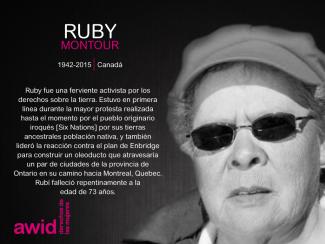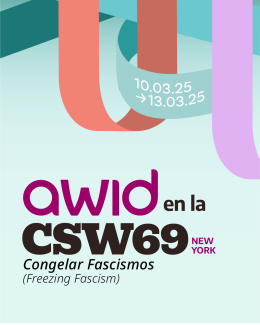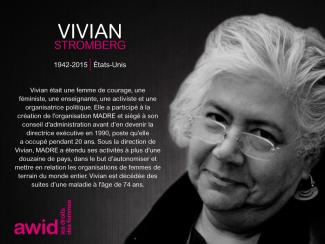Politique de confidentialité de l’AWID : À propos de vos droits à la confidentialité et des cookies
Cette politique régit toutes les pages hébergées sur le site www.awid.org, et tout autre site web géré par l'AWID, ainsi que les pages d’inscription à ces sites. Elle ne s'applique pas aux pages hébergées par des organisations autres que l'AWID auxquelles nous pouvons nous associer, et dont les politiques de confidentialité peuvent différer. Veuillez lire le document suivant pour comprendre notre politique de confidentialité concernant la nature, le but, l'utilisation et le partage de vos données personnelles collectées via ce site web.
1 Types de données collectées sur ce site
D’une manière générale, vous pouvez naviguer sur ce site web sans nous soumettre vos informations personnelles. Cependant, dans certaines circonstances, nous vous demanderons de nous fournir certaines données personnelles.
1.1 Données que vous nous fournissez
Lorsque vous êtes sur le site web et que nous vous demandons des données personnelles, ces informations ne sont pas partagées en dehors de l’AWID.
1.1.1 Les données que vous fournissez pour obtenir des mises à jour de l'AWID :
Lorsque vous vous inscrivez pour avoir accès au site web - par exemple, que vous vous abonnez pour recevoir des courriels de notre part ou que vous demandez à devenir membre – nous vous demandons de fournir des données personnelles telles que votre nom, pays, langue, courriel pour recevoir les mises à jour. Vous nous transmettez ces informations grâce à des formulaires sécurisés et elles sont stockées sur des serveurs sécurisés.
1.1.2 Les données de paiement que vous envoyez pour devenir membre ou vous inscrire à un événement :
En devenant membre ou en vous inscrivant à des événements, vous devrez peut-être également fournir des données de paiement. L’AWID ne stocke aucune information de carte de crédit sur ses serveurs et utilise des systèmes de paiement sécurisés pour traiter ces informations.
1.1.3 Les informations facultatives que vous avez choisi de nous fournir (avec votre consentement) :
Lorsque vous communiquez avec l’AWID ou que vous fournissez des informations facultatives via des formulaires en-ligne ou utilisez le site pour communiquer avec d'autres membres, nous recueillons ces informations et toute information que vous choisissez de donner.
1.1.4 Les données que nous recueillons via des formulaires de contact ou lorsque vous communiquez directement avec nous :
Lorsque vous communiquez avec nous, nous recueillons ces données ainsi que toute autre information que vous choisissez de nous fournir.
1.2 Données collectées automatiquement (cookies tiers):
- De plus, lorsque vous interagissez avec le site web, nos serveurs sont susceptibles de conserver un journal d'activité qui ne vous identifie pas individuellement (« Données non personnelles »). En règle générale, nous recueillons les catégories suivantes d'informations non personnelles :
- Nous pouvons recueillir certaines données démographiques telles que l'année de naissance et le genre lors de la collecte de renseignements personnels .
- Nous collectons et stockons certaines données relatives à votre ordinateur, appareil mobile ou tout autre appareil utilisé pour accéder au site web. Ces informations peuvent inclure une adresse IP, des informations de géolocalisation, des identificateurs uniques, le type de navigateur, la langue du navigateur et d'autres informations transactionnelles.
- Nous enregistrons automatiquement certaines informations concernant votre utilisation du site web. Cela comprend un historique de lecture des pages que vous consultez. Nous utilisons ces informations pour améliorer l’accès aux contenus de notre site web.
- Nous collectons et stockons des « données de trafic » supplémentaires telles que l'heure d'accès, la date d'accès, les rapports de panne de logiciel, le numéro d'identification de session, les temps d'accès et les adresses de sites web de référence.
- Nous collectons et stockons vos mots-clés de recherche ainsi que vos résultats de recherche.
- Nous collectons et stockons également certaines autres informations concernant l'utilisation du site web par nos utilisateurs-trices -trices afin que des tiers puissent nous fournir des rapports et des analyses concernant l'utilisation et les modes de navigation du site web.
Nous collectons et stockons également certaines autres informations concernant l'utilisation de notre site web par nos utilisateurs-trices afin que des tiers puissent nous fournir des rapports et des analyses concernant l'utilisation et les modes de navigation des utilisateurs-trices.
Pour plus d'informations sur les cookies, veuillez consulter la page suivante : www.allaboutcookies.org/fr/.
Si vous ne souhaitez pas recevoir de cookies, vous pouvez facilement modifier le paramétrage de votre navigateur web pour refuser de recevoir des cookies, ou pour demander d’être informé-e lorsque vous recevez un nouveau cookie. Cliquez ici pour voir comment procéder.
2.0 Utilisation des informations collectées sur ce site
L'AWID utilise les informations collectées à propos de vous pour :
- Mieux comprendre comment vous utilisez notre site web pour pouvoir améliorer votre expérience de navigation
- Communiquer avec vous par courriel pour partager des ressources et des analyses dans le domaine des droits des femmes, rester en contact avec vous et vous fournir des opportunités de vous engager à nos côtés, vous tenir au courant de l'évolution de l'AWID et de nos partenaires.
- Nous conformer à nos obligations légales de :
- Détecter et empêcher la fraude, les spam, les abus, les incidents de sécurité et autres activités nuisibles.
- Mener des enquêtes de sécurité et des évaluations de risques.
- Vérifier ou authentifier les données que vous nous fournissez (par exemple pour vérifier votre autorisation d'agir à titre de mandataire pour le compte d'une organisation à but non lucratif).
- Effectuer des contrôles dans les bases de données et autres sources d'information, dans la mesure permise par les lois en application.
- Résoudre tout différend avec l'un-e de nos utilisateurs-trices ou client-e-s et faire respecter les accords passés avec des tierces parties.
- Faire respecter nos conditions d'utilisation et autres politiques.
3.0 Envoi d'informations
Si vous vous êtes abonné-e aux bulletins électroniques de l'AWID ou à des mises à jour par courrier électronique ou si vous êtes devenu-e membre, nous vous enverrons régulièrement des informations, ainsi qu’indiqué dans la section correspondante du site web. Vous pouvez vous désabonner à tout moment des bulletins électroniques ou des mises à jour par courriel en suivant les liens vers les informations de désabonnement incluses dans nos courriels.
4.0 Accéder à vos données, modifier et supprimer des informations
L'exactitude des données vous concernant personnellement est importante pour l'AWID. Nous sommes en permanence à la recherche de moyens pour vous faciliter l’accès aux données que l'AWID conserve à votre sujet via notre site web et à la possibilité et les modifier. Si vous changez votre adresse e-mail, ou si l'une des autres informations que nous détenons est inexacte ou n’est plus d’actualité, merci de nous contacter ici.
Si vous avez consenti à ce que l’AWID utilise vos données personnelles, vous pouvez néanmoins changer d’avis à tout moment en nous contactant et en spécifiant l’autorisation que vous annulez. Veuillez noter que le retrait de votre consentement n'affecte pas la légalité des activités de traitement basées sur ce consentement avant son retrait.
- Le cas échéant, vous pouvez également avoir accès à une copie de vos données personnelles lisible par ordinateur. Si vous souhaitez avoir une copie des données personnelles que nous détenons vous concernant, ou si vous pensez que nous détenons des données personnelles incorrectes sur vous, merci de bien vouloir nous contacter.
- Vous avez également le droit de nous demander de supprimer vos données personnelles ou de restreindre la manière dont elles sont utilisées. Il peut y avoir des exceptions au droit d'effacement pour des raisons juridiques spécifiques que nous pouvons vous exposer sur demande.
- À tout moment, quelle que soit la loi applicable, vous pouvez vous opposer au traitement de vos informations personnelles à des fins de marketing direct. Vous pouvez, à tout moment, demander à l'AWID de cesser le traitement de vos données à des fins de marketing direct en nous contactant.
5.0 Partage d'informations
Excepté dans le cas détaillé ci-dessous, l'AWID ne divulgue aucune de vos informations personnelles et ne vend ni ne loue des listes contenant vos informations à des tiers. L'AWID peut divulguer des informations quand elle a votre permission de le faire ou dans des circonstances particulières, par exemple lorsqu’elle croit de bonne foi que la loi l'exige.
6.0 Sécurité de l'information
Nous mettons continuellement en œuvre et mettons à jour les mesures de sécurité administratives, techniques et physiques afin de protéger vos données contre tout accès non autorisé, perte, destruction ou altération de celles-ci. Certaines des mesures de protection que nous utilisons pour protéger vos informations sont les pare-feu, le cryptage des données et les contrôles d'accès aux informations. Si vous savez, ou avez des raisons de croire, que vos informations d'identification AWID ont été perdues, volées, détournées ou autrement compromises, ou en cas d'utilisation non autorisée réelle ou suspectée de votre compte d'adhésion à l’AWID, veuillez nous contacter.
7.0 Modifications de cette politique et nous contacter
Cette politique est susceptible d’être modifiée de temps à autre. La dernière version de la politique sera postée sur notre site web, ainsi que la date de sa dernière mise à jour. En cas de modification(s) apportées à cette politique, vous recevrez une mise à jour par courriel. Au cas où vous ne seriez pas d'accord avec la politique ainsi révisée, vous aurez la possibilité d'annuler votre (vos) abonnement(s) chez nous. N’hésitez pas à nous contacter. Tous vos commentaires au sujet de cette politique sont les bienvenus !
Dernière mise à jour : mai 2019









